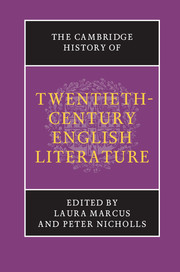Book contents
- Frontmatter
- Introduction
- PART ONE WRITING MODERNITY
- PART TWO THE EMERGING AVANT-GARDE
- PART THREE MODERNISM AND ITS AFTERMATH, 1918–1945
- PART FOUR POST-WAR CULTURES, 1945–1970
- PART FIVE TOWARDS THE MILLENNIUM, 1970–2000
- 32 The Seventies and the cult of culture
- 33 Feminism and writing: the politics of culture
- 34 The half-lives of literary fictions: genre fictions in the late twentieth century
- 35 Theatre and politics
- 36 Irish literature: tradition and modernity
- 37 Scottish literature: Second Renaissance
- 38 Towards devolution: new Welsh writing
- 39 British–Jewish Writing and the turn towards diaspora
- 40 Fiction and postmodernity
- 41 Postcolonial fictions
- 42 Writing lives
- 43 Poetry after 1970
- 44 Ending the century: literature and digital technology
- Bibliography
- Index
- References
32 - The Seventies and the cult of culture
from PART FIVE - TOWARDS THE MILLENNIUM, 1970–2000
Published online by Cambridge University Press: 28 March 2008
- Frontmatter
- Introduction
- PART ONE WRITING MODERNITY
- PART TWO THE EMERGING AVANT-GARDE
- PART THREE MODERNISM AND ITS AFTERMATH, 1918–1945
- PART FOUR POST-WAR CULTURES, 1945–1970
- PART FIVE TOWARDS THE MILLENNIUM, 1970–2000
- 32 The Seventies and the cult of culture
- 33 Feminism and writing: the politics of culture
- 34 The half-lives of literary fictions: genre fictions in the late twentieth century
- 35 Theatre and politics
- 36 Irish literature: tradition and modernity
- 37 Scottish literature: Second Renaissance
- 38 Towards devolution: new Welsh writing
- 39 British–Jewish Writing and the turn towards diaspora
- 40 Fiction and postmodernity
- 41 Postcolonial fictions
- 42 Writing lives
- 43 Poetry after 1970
- 44 Ending the century: literature and digital technology
- Bibliography
- Index
- References
Summary
In the post-war world, it is the late sixties and seventies which give birth to much of what we recognise as contemporary culture: a commodified counterculture; identity politics; the celebration of popular culture and its recycling of materials; suspicion of authority and political process. The turbulent decade of the seventies is marked by a release and dissemination of energies which have their origins in the political rebellions of the sixties, and by a move towards culture itself as the ground of debate and resistance. This was a move reinforced theoretically by the ‘New Left’ with its emphasis on culture, increasingly broadly denned, as a site of contestation, and a shift towards notions of hegemony and false consciousness derived from Antonio Gramsci and Louis Althusser, rather than the ‘Old Left’ emphasis on class, labour and dialectics. The period also sees the rise of the discourse of Postmodernism itself as an analytic framework for contemporary historical faultlines.
At the same time, the seventies is a decade we associate with a number of cultural problems: kitsch, nostalgia, violence, paranoia and the origins of the radical conservatism of the eighties. Three strands will be highlighted in what follows: the anxiety associated with notions of cultural and personal freedom; the question of the representation of history when history’s narratives seem to have been corrupted; and the issue of identity politics. The discussion will move fairly freely between a postmodernising American context which, in retrospect, seems to set the scene for cultural shifts elsewhere, and a British context in which a troubled sense of post-Suez shock, economic decline, and historical and geographical inheritance informs literature in distinctive ways.
- Type
- Chapter
- Information
- The Cambridge History of Twentieth-Century English Literature , pp. 583 - 599Publisher: Cambridge University PressPrint publication year: 2005

